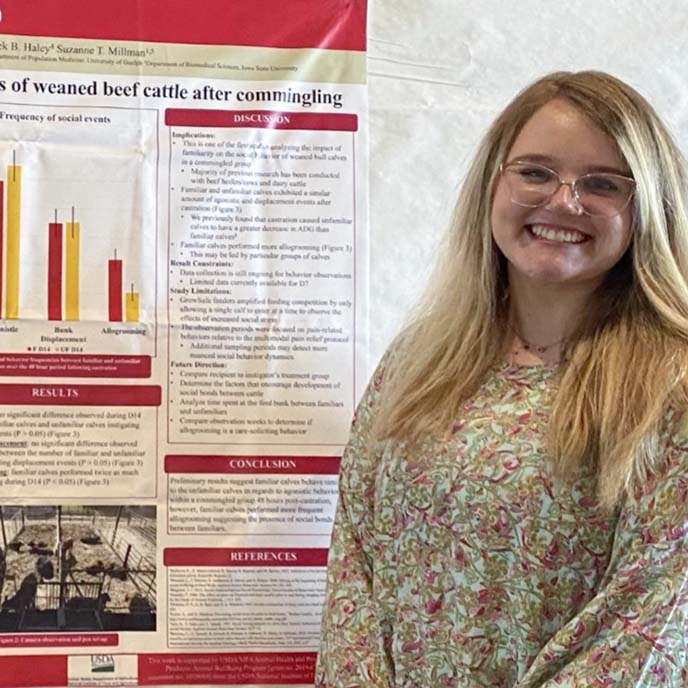
Animal welfare is a strong interest for Jordan Schroeder.
Beef cattle? Not so much. In fact, the second-year veterinary student had no experience with cattle prior to the summer Scholar research project she undertook this summer.
Schroeder worked with Dr. Suzanne Millman, professor of veterinary diagnostic and production animal medicine and the Scott and Nancy Armbrust Professor in Veterinary Medicine, on “Does Social Buffering Enhance Animal Welfare and Performance When Beef Calves are Commingled in Feed Yard Environments?”
The College of Veterinary Summer Scholar Research Program introduces veterinary medicine students to research in a wide array of areas. Participants choose to investigate specific issues that match their interest and the work of an established researcher.
Milliman is an award-winning animal welfarist. It was a great fit for Schroeder.
“I am passionate about improving welfare for all species through medicine, community education, and intervention,” she said. “All animals, regardless of species or purpose, deserve to be treated with respect and proper care to reduce animal suffering.”
That includes beef cattle. And even though Schroeder prefers to work in small animal shelters, she sought out this research project.
“I wanted to learn about how animal welfare is accomplished in other fields,” she said. “One of the most important ways to improve animal welfare is through community outreach and education.
“It is important to have a thorough understanding of different species to be able to help owners and producers maximize the welfare of animals in their care.”
The project Schroeder undertook was a smaller part of a larger study looking into the effects of commingling on feedlot cattle welfare.
She specifically analyzed the effect familiarity had on social behaviors pre- and post-castration to determine if familiar cattle developed social bonds. Her research team recorded the frequency of agonistic and affiliative behaviors instigated by familiar and unfamiliar calves prior to and after castration.
Then she compared the results.
“The objective was to see if familiar cattle acted differently than unfamiliar cattle in response to a major stressful event,” she said. “Ultimately I wanted to gain research experience to see if academia or a research-focused career was a good fit for me.”
If nothing else, Schroeder’s Summer Scholar research project did accomplish one thing.
“I already have a bit of clinical experience, so I thought It would be advantageous to try other fields in veterinary medicine to expand my perspective for when I decide to pursue a career,” she said. “I learned more about cattle welfare and behavior in just a few months over the summer than I would have in the normal curriculum.”
September 2023
